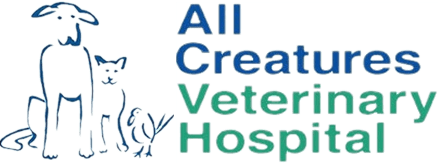Pocket Pet Health & Care
Small mammals such as rabbits, chinchillas, and guinea pigs – known as “pocket pets” – have very different gastrointestinal systems than dogs and cats. Many of the small mammals, except ferrets, have a large cecum, which is a pouch between the small intestine and colon that is built to ferment and break down the fiber. In the rabbit, the cecum is ten times larger than the stomach. Billions of specialized bacteria live in the intestine cecum and colon. Some yeast and protozoa that do not cause disease also live in the cecum. The bacteria in the cecum and colon work to break down and ferment the fiber that in turn keeps the intestine contracting, digesting and absorbing nutrients. In the rabbit, the specialized bacteria flow backward into the cecum to preserve their numbers. These pets eat their own feces on a daily basis to re-culture their gut with the specialized bacteria.
These pets even have specialized flat premolar and molar teeth called cheek teeth which can grind the hay up to 120 times per minute. If they do not get a diet with 90% fiber (such as a mostly pelleted diet) the teeth will not grind enough and they will become elongated with spikes that damage the tongue and cheek. If overgrown enough the teeth can prevent the pet from eating.
Although treats are not required for rabbits or other small herbivores, limited appropriate treats can be beneficial for strengthening the pet/owner bond, training, and enrichment. It is important to limit the number of treats and ensure they are low in protein, fat, calcium, and sugar. Some examples of inappropriate treats are nuts, seeds, popcorn, bread, crackers, and yogurt drops. High-fiber grass and alfalfa based treats are appropriate in limited amounts, as are small amounts of dried fruits/veggies. There are far more inappropriate treats on the market, but good products do exist.
Pets that are fed an improper diet such as mostly pelleted food and no hay are much more prone to a problem called gastrointestinal stasis. The intestines stop propelling food because there is not enough fiber, water and normal bacteria for proper peristalsis and digestion to occur. Sometimes the pellets are just adhered together in a big ball obstructing the stomach so little can get past. Soon the pet stops eating and drinking which makes the problem even worse. None of these pets should go for longer than 24 hours without eating.
Summary of pocket pet dietary requirements:
Feed 70-75% high-quality grass hay
- Grass Hay is fed primarily to supply high fiber. This ensures good movement in the GI tract. It also keeps the normal bacteria in the GI tract normal.
- Orchard grass timothy and oat hay are all acceptable choices.
- Alfalfa hay is high protein hay that is not needed if they are eating some pelleted food. Not only will they eat it they will use it to build beds and it will keep them active and busy building.
High fiber uniform pellets 20-25%
- Timothy or alfalfa pellets.
- Avoid added seeds fruits and vegetables. The pet will eat only the added goodies and ignore the pellets.
- Do not overfeed pellets.
- Rabbits require only 1.5 tablespoons for every 2.2 lbs. of weight.
Fresh or dried greens 5-15%
- Fresh and dried greens can be an important and enjoyed component of a rabbit’s and small herbivore’s diet but are not required. They do, however, provide an excellent source of water and enrichment.
- Varying types and textures is a great enrichment tool.
- It is recommended to completely wash and clean all greens. Organic products are preferable.
Treats 0-.5%
- Make the treat is low sugar and high fiber.
Unlimited clean water
- Offer water in a crock and a water bowl
- Pets offered crocks of water drink 30% more than those with just a water bottle so it is a good idea to have two water sources.
Following these rules of nutrition will help your exotic mammal to live an active long and healthy life.
Links
Check out these great sites for more information on pocket pet health:
www.rabbitnetwork.org
www.rabbit.org
www.Lafebervet.com
Some of the articles you’ll find on the Lafeber site:
- Spaying and Neutering Pet Rabbits
- Chinchillas
- Care of the Pet Ferret
- Hedgehogs
- Care of the Pet Rat
All Creatures Veterinary Hospital provides wellness information for rabbits, chinchillas, guinea pigs and other pocket pets in Salem and the North Shore areas of Massachusetts.








